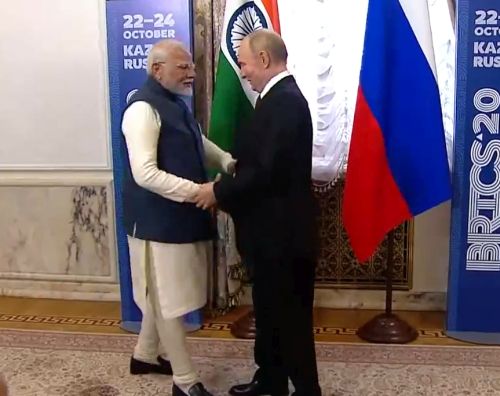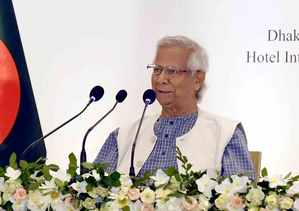International
PM Modi continues to bat on front foot for Global South in his third innings
New Delhi, June 15 (IANS) The Group of Seven (G7) Summit held in Italy’s Apulia on Friday has further solidified India’s image as the leader of the Global South, right at the start of Prime Minister Narendra Modi’s third consecutive term.
Having given resonance to the voice of the Global South over the last decade, especially during India’s G20 presidency, PM Modi once again chose a major global platform to spotlight the concerns of developing countries during his first overseas trip after assuming office, earlier this week.
“The countries of the Global South are bearing the brunt of global uncertainties and tensions. India has considered it its responsibility to place the priorities and concerns of the countries of the Global South on the world stage,” the Prime Minister said in his address at the Outreach Session of the G7 Summit.
With India having strongly established itself as an all-weather friend of Africa during his tenure, PM Modi also emphasised New Delhi’s commitment to the continent.
“We have given high priority to Africa in these efforts. We are proud that the G-20, under India’s chairmanship, made the African Union a permanent member. India has been contributing to the economic and social development, stability, and security of all African countries, and will continue to do so,” he assured the world leaders gathered at the G7 event.
On Saturday, hours after his meeting with PM Modi at Borgo Egnazia, German Chancellor Olaf Scholz backed the Indian Prime Minister’s efforts to further amplify the voices from the emerging countries and the Global South at international fora.
“The G7 is not an exclusive club. That is why here in Apulia we continued what we started in Elmau and spoke to many representatives of the Global South. This must continue to be the case in the future. Because we want a partnership from which everyone benefits,” Scholz posted on X along with a photograph of him engaged in an animated discussion with PM Modi and Japanese Prime Minister Fumio Kishida during the G7 event on Friday.
Even as he pursues the goal of having a ‘Viksit Bharat’ by 2047, PM Modi has made it clear that India’s efforts to drive South-South cooperation will receive fresh momentum during his third term.
The attendance of Bangladesh Prime Minister Sheikh Hasina, Sri Lankan President Ranil Wickremesinghe, Maldives President Mohamed Muizzu, Seychelles Vice-President Ahmed Afif, Mauritius Prime Minister Pravind Kumar Jugnauth, Nepal Prime Minister Pushpa Kamal Dahal ‘Prachanda’ and Bhutan PM Tshering Tobgay at the PM’s swearing-in ceremony sent a strong message that India will always remain committed to the cause of the Global South and the developing countries.
“PM Modi called for deeper people-to-people ties and connectivity in the region. He further added that India would continue to amplify the voice of the Global South in the international arena,” the Ministry of External Affairs said after the PM’s interaction with the leaders at the Rashtrapati Bhawan.
In the past too, leaders of the developing countries across various continents instilled faith in PM Modi’s leadership and counted on India as a reliable partner when it came to making their voices heard at the gatherings of world leaders amid the ongoing geopolitical tensions.
Last year, when he travelled to Port Moresby to host the third summit of the Forum for India–Pacific Islands Cooperation (FIPIC III Summit) jointly with his counterpart from Papua New Guinea, James Marape, leaders of the small island countries called themselves as “victims of global powerplay” and called on PM Modi to further elevate the issues of concern to the region.
“You are the voice that can offer our issues at the highest level as advanced economies discuss matters relating to economy, commerce, trade, and geopolitics. We want you to be an advocate for us as you sit in those meetings and continue to fight for the rights of small emerging nations and emerging economies,” Marape said in his address.
Several countries in Africa and the Caribbean also consider India and Prime Minister Modi as their flag bearer on the global stage.
During her visit to New Delhi last October, Tanzanian President Samia Suluhu hailed India as a powerhouse, an extended family member separated by a coastline, a friend for all seasons, and a leader of the Global South.
“Beyond familyhood and trade partnership, India is our strategic ally. India is now a powerhouse. It possesses the needed soft and hard powers enough to shape outcomes, influence change, and raise a voice to be heard in the lobbying corridors, and rooms where world decisions are made, and our fate as developing countries is decided,” she said while receiving her first foreign honourary doctorate from the Jawaharlal Nehru University (JNU).
Similarly, the 15-member Caribbean Community (CARICOM) has time and again highlighted the significance of maintaining a “close and vibrant working relationship” with India — a country they believe is playing a major role in having their voices heard at major global platforms.
India’s position as a voice of the Global South is expected to further consolidate during Modi 3.0 using the Prime Minister’s 5S approach of ‘Samman, Samvad, Sahyog, Shanti, and Samriddhi’, as was listed in the ‘Sankalp Patra’ released by the BJP for the just-concluded Lok Sabha elections.
“A distinct global image has been built in the last 10 years as India has emerged as a Vishwa Bandhu. Its maximum advantage will begin now. I am fully confident that the next five years will be extremely useful for the country as far as the global environment is concerned,” the Prime Minister asserted in his first comments after staking a claim to form the government for the third consecutive time, last week.
–IANS
as/uk/arm
International
Lee Hsien Yang seeks refuge in United Kingdom

Lee Hsien Yang, the youngest son of Singapore’s founding father, the late Lee Kuan Yew, announced on Tuesday that he is now a political refugee in the United Kingdom after seeking asylum from the British government “as a last resort.”
“I remain a Singapore citizen and hope that someday it will be safe to return home,” Lee stated in a Facebook post, as reported by Channel News Asia (CNA).
Citing what he described as the Singapore government’s “attacks” against him, Lee, who is the younger brother of former Prime Minister Lee Hsien Loong, revealed that he sought asylum protection in 2022.
Lee Hsien Yang and his late sister, Lee Wei Ling, who passed away earlier this month, have been in conflict with their brother Lee Hsien Loong over the fate of their father’s home following his death in 2015, resulting in a public dispute that has estranged the siblings.
In an interview with the UK-based newspaper The Guardian, Lee alleged that a “campaign of persecution” compelled him to seek asylum in Britain.
In response to his claims, the Singapore government stated that there is “no basis” for his allegations of “a campaign of persecution” or other assertions regarding political repression in the country.
“Singapore’s judiciary is impartial and makes decisions independently. This is why Singaporeans have a high level of trust in the judiciary,” a government spokesperson remarked.
The spokesperson added that there are no legal restrictions preventing Lee and his wife, lawyer Lee Suet Fern, from returning to Singapore. “They are and have always been free to return to Singapore,” the spokesperson said.
Lee and his wife have been outside of Singapore since 2022, having opted not to attend a scheduled police interview regarding potential offenses related to providing false evidence in judicial proceedings concerning their father’s will and the family home.
Lee and his late sister, who had been living at the property, alleged they felt threatened while trying to fulfill their father’s wish to demolish the house. They also accused their elder brother, former Prime Minister Lee Hsien Loong, of abusing his governmental influence to advance his personal agenda.
International
Indo-Russian ties are stronger than ever before at BRICS

Kazan, Russia: Prime Minister Narendra Modi held a bilateral meeting with Russian President Vladimir Putin on the sidelines of the 16th BRICS Summit.
During the meeting, President Putin remarked, “I recall our meeting in July, where we had productive discussions on various issues. We’ve also spoken over the phone several times. I am very grateful you accepted the invitation to come to Kazan. Today, we will attend the BRICS Summit’s opening ceremony, followed by dinner.”
PM Modi responded by expressing his appreciation, saying, “I sincerely thank you for your friendship, warm welcome, and hospitality. It’s a great pleasure to visit such a beautiful city as Kazan for the BRICS Summit. India shares deep historical ties with this city, and the opening of our new embassy here will further strengthen these connections.”
International
Laos seeks to enhance nutrition amid climate change concerns

Vientiane (Laos), Aug 22 (IANS) Representatives from the Lao government and development partners have attended a conference here titled “Climate Change and Nutrition in Laos: Intersections and Interventions” to discuss the impact of climate change on nutrition in the Southeast Asia country and potential solutions.
Speaking at the conference, deputy director general of the Department of Hygiene and Health Promotion under the Lao Ministry of Health Viengkhan Phixay, said, “We gather to address a critical and interwoven issue: the impact of climate change on nutrition and how we can work together to tackle these challenges,” Xinhua news agency reported.
The Lao government is actively engaged in this endeavor, with numerous policies and initiatives aimed at addressing both climate change and nutrition, Lao National Television reported on Thursday.
“By leveraging the Scaling Up Nutrition network in Laos, which is led by the government, and supported by civil society, donors, and the United Nations, we have a robust platform to tackle the negative impacts of climate change while improving nutrition and overall health for everyone in Laos,” Viengkham said at the conference held on Monday.
The conference featured a series of presentations that not only detailed evidence-based research but also introduced innovative tools for measuring and enhancing nutrition under the impact of climate change.
The conference stressed the critical need for integrated approaches to tackle the intertwined challenges of climate change and nutrition, and setting the stage for impactful future collaborations.
–IANS
int/psd
International
One killed, seven injured in shootout in Iraq

Baghdad, Aug 22 (IANS) A civilian was killed while seven others were injured on Thursday in a tribal shootout in Iraq’s holy Shiite province of Najaf, according to a local security source.
The shootout erupted in the early hours between armed men from the local tribe in the al-Zarga area in northern Najaf, some 160 km south of Baghdad, a local police officer told Xinhua on condition of anonymity.
The clash resulted in the killing of an Iraqi civilian and the injury of seven others, including three Iranian Shiite pilgrims, the source added.
A joint force from the Interior Ministry’s emergency response division and Najaf provincial police arrested 53 gunmen from both sides of the shootout and seized weapons and ammunition, the Interior Ministry said in a statement.
It added that search operations are ongoing to locate additional gunmen and weapons, with more details to be released later.
The incident took place as numerous pilgrims traveled to the city of Karbala to observe Arbaeen, which marks the end of a 40-day mourning period for the killing of Imam Hussein, the grandson of Prophet Muhammad, in the Battle of Karbala in 680 A.D.
Typically, these pilgrims also visit Najaf as part of their journey to Karbala.
–IANS
int/jk/arm
International
Bangladesh seeks $1 billion budget support from World Bank

Dhaka, Aug 22 (IANS) Bangladesh’s interim government has sought $1 billion from the World Bank as budgetary support.
The call came from the country’s Power, Energy and Mineral Resources Adviser Muhammad Fouzul Kabir Khan’s meeting with Abdoulaye Seck, the World Bank’s Country Director for Bangladesh and Bhutan, in Dhaka on Wednesday.
He made the plea as the ministry owes more than 2 billion dollars to suppliers in import costs of power and energy, Xinhua news agency reported.
Khan mentioned that the interim government, which was formed with many pressing mandates, is due to settle a $2 billion debt left by the previous government in the power sector.
He said they have already suspended activities under the much-criticized Quick Enhancement of Electricity and Energy Supply Act 2010 and abolished the government’s power to set energy prices without any public hearing.
On August 5, the former Prime Minister of Bangladesh, Sheikh Hasina, was ousted from her country and power, ending her rule since January 2009.
This event was seen as a massive escalation, with what initially started as student’s protests and resulted in a major crisis in Bangladesh.
Earlier on August 8, Nobel laureate Muhammad Yunus took oath as the head of Bangladesh’s interim government.
–IANS
int/jk/as
-
Video2 years ago
PM Modi Attacks Congress in Karnataka with “Kerala Story”
-
Politics2 years ago
Siddaramaiah & DK Shivakumar sworn in as Chief Minister & Deputy CM respectively
-
Cricket2 years ago
CSK players rejoice 5th IPL title with their families (Pics)
-
Entertainment2 years ago
Karan Deol weds his longtime Girlfriend Drisha Acharya (Pics)
-
Sports7 years ago
History Of Official FIFA WORLD CUP Match balls
-
India2 years ago
Ashwini Vaishnaw: Railway Board recommends CBI probe in the Odisha railway disaster
-
Entertainment2 years ago
Urvashi Rautela dazzles on Cannes 2023 red carpet (Pics)
-
Entertainment2 years ago
Sunny Leone gets ready for Kennedy premiere in Cannes (Pics)





























